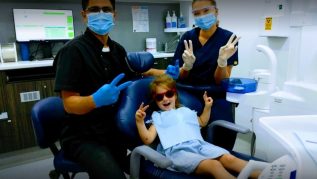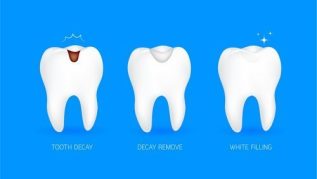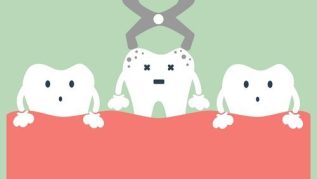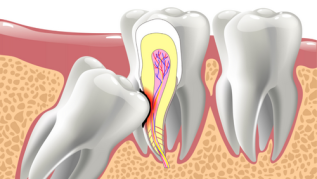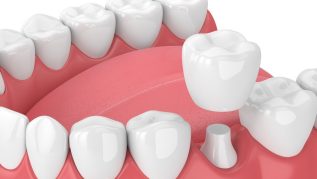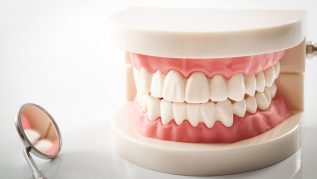- Mon to Thu: 8am - 8pm*, Fri: 8am - 6pm*, Sat: 8am - 4pm*
Gum Disease Treatment
My Gentle Dentist Arana Hills will Resolve Your Gum Problems Quickly, Safely & Effectively
Gum Disease Treatment
Do your gums bleed after flossing or brushing?
Does it hurt when you bite into crunchy or hard foods?
Do you notice the colour of your gums turning darker?
What are Gum Diseases?
Gum disease (periodontal disease) is one of the most common oral diseases. Also known as periodontists.
Gingivitis is a mild form of gum disease that is characterized by bleeding and inflammation of the gums.
Periodontal is typically caused by poor brushing and flossing habits that allow plaque—a sticky film of bacteria—to build up on the teeth and harden.
What does advanced gum disease look like?:
Gingivitis is the term for periodontal disease’s early stages. Although gingivitis typically does not hurt, it can nonetheless exhibit some Symptoms of Periodontal Disease, such as:
- Sore, bleeding gums
- Painful chewing problems, and even
- Tooth loss
- Red, swollen, or tender gums
Note: Gum disease has been linked to heart disease, low birth weight in babies and other health problems, so it is a condition that should be taken seriously.
Did we scare you? Good!
Gum disease is bad stuff, but it can be treated.
The earlier you start keeping your gums healthy the happier your teeth, smile and your overall health will be.
Normal Tooth Vs. Periodontitis
Let us Explain Gum Disease “Visually” to You
All About Gum Disease
Can I See Some Pictures to Better Understand Gum Disease?
Sure!
The following images show the progression of gum disease:

1. Healthy gums holding teeth firmly in place.

2. Infection due to plaque (germs) and calculus (tartar) beginning to destroy the supporting gums and bone around the teeth.

3. Severe loss of gum and bone support as infection continues untreated. It leads to loose teeth, followed by loss of teeth.
What are signs of severe Gum Disease?
Your mouth is full of bacteria that live off the food and sugars left behind after you eat. These bacteria can form sticky, gooey plaque.
Plaque releases acid that weakens your tooth enamel and irritates your gums.
If you brush and floss thoroughly and regularly, you can remove these bacteria from your teeth and gums before they have a chance to cause a problem.
However, when you grow lax with your Dental hygiene, these bacteria proliferate, infecting your gum tissue and leading to the symptoms of gum disease.
Once the bacteria work their way between your gums and your teeth, they become harder to remove.
Plaque Releases Acid that Weakens Your Tooth Enamel and Irritates Your Gums
Smoking is the Most Significant Risk Factor for Gum Disease
Who Can Get Gum Disease and What are the Risk Factors?
Anyone can develop gum disease.
It is seen in young teens, adults, and older adults alike.
However, some people are at an increased risk of gum diseases compared to others.
Smoking is the most significant risk factor and can make treatment for gum disease less successful.
Here are the other most common risk factors for gum disease:
- Diabetes
- Hormonal changes in girls and women
- Medications that lessen the flow of saliva
- Certain illnesses, such as AIDS, and their medications
- Genetic susceptibility.
What are signs of severe Gum Disease?
Gum disease is progressive; the symptoms are subtle, thus not readily detectable.
In fact, you probably won’t see or feel the first signs of gum disease, and that is the reason why a trained eye and skill of a dentist or periodontist is more likely to help you out with this.
Gum disease occurs in several stages.
Early-stage gum disease is known as gingivitis, a term that means.
Later-stage gum disease is known as “periodontitis,” a term that refers to inflammation of the periodontal ligaments, which are connective tissues that anchor your teeth into your jawbone.
The symptoms of gum disease start off rather minor but become harder to overlook as the condition worsens.
Gingivitis is Early-Stage Gum Disease and Periodontitis is Later-Stage Gum Disease
Bad Breath is a Hallmark Symptom of Gum Disease
Gingivitis is the term for periodontal disease’s early stages. Although gingivitis typically does not hurt, it can nonetheless exhibit some Symptoms of Periodontal Disease, such as:
- Bad breath that won’t go away
- Red or swollen gums
- Tender or bleeding gums
- You see white spots or plaque on your gums
- You have sores in your mouth
- Painful chewing
- Loose teeth
- Sensitive Teeth
- Receding gums or longer appearing teeth.
If you experience any of these symptoms call us for an appointment.
Your teeth, and your health, depend on stopping gum disease before it does more damage.
How Gum Disease is treated?
Cleaning your teeth of plaque and tartar is the first step in addressing Treatment for gingivitis. A dentist or dental hygienist can perform this. Scaling entails removing plaque and tartar from the gum line and below.
Plaque and tartar are removed from the roots of the teeth via root planning. Your dentist or periodontist will examine your teeth after a cleaning to see if the spaces between your teeth and gums have gotten any deeper. If they have, Periodontal surgery may be required to remove them.
Antibiotics may be used to treat Gum redness in specific circumstances. These can be applied directly to the gums or consumed by mouth.
At a Dental visit, a Dentist or Dental hygienist will do 3 things:
- Examine your gums and note any signs of inflammation.
- Use a tiny ruler called a “probe” to check for and measure any pockets around the teeth. In a healthy mouth, the depth of these pockets is usually between 1 and 3 millimetres. This test for pocket depth is usually painless.
- Ask about your medical history to identify conditions or risk factors (such as smoking or diabetes) that may contribute to gum disease.
Note: The Dental professional may also:
- Take an x-ray to see whether there is any bone loss
- Refer you to a periodontist. Periodontists are experts in the diagnosis and treatment of gum disease and may provide you with treatment options that are not offered by your Dentist.
My Gentle Dentist are Experts in Diagnosing Gum Disease
Goal of Gum Disease Treatment is to Control the Infection
What is the Goal of Periodontists Treatment?
The goal of treatment, in gum disease, is to reduce the pockets caused by toxic build up and shifting teeth. In other words, to control the infection.
Your gum disease treatment will depend on several factors, including your personal healthy history and the stage of your gum disease.
Any type of treatment requires that the patient keep up good daily care at home.
The dentist may also suggest changing certain behaviours, such as quitting smoking, as a way to improve your treatment results.
Your dentist will talk to you about a treatment plan that works best for you.
As with most oral health ailments, gum disease is easier to prevent than it is to treat.
If you develop gum disease, it is very important to seek prompt treatment.
Left untreated, gum disease can lead to missing teeth and therefore regular dental checkups are strongly recommended as prevention is always better than cure.
How to treat Gum Disease?
Professional Cleaning:
In the very early stages – when it is gingivitis – you may just need a professional cleaning from your Dental team.
They can also give you some great advice and tips on how you can keep your teeth and gums healthy.
Scaling and Root Planing:
If your gum disease is beyond gingivitis, the first step in treating gum disease usually involves scaling and root planing.
This treatment may be done over more than one visit, depending on your personal needs.
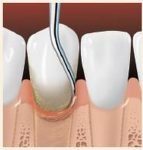
Root Planing Smoothes the Tooth Root and Helps the Gums Reattach to the Tooth.
Scaling Removes Plaque and Tartar from Below the Gum Line.
Healed Site After Periodontal Surgery
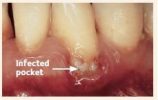
Healed pocket after treatment.
Periodontal Surgery:
Sometimes, scaling and root planing is not enough treatment on its own.
If pockets do not heal enough after scaling and root planing, gum surgery may be needed.
Surgery allows your Dentist to remove plaque and tartar from hard-to-reach areas.
Afterwards, your gums will be stitched into place to tightly hug your teeth.
Surgery can also help to shrink pocket depth and make it easier for you to keep your teeth clean.
Are There Any Alternative Options for Treating Gum Disease?
Gum disease symptoms are preventable. By being aware of the risk factors, you can help prevent gingivitis:
- Brushing your teeth twice a day with a fluoride toothpaste
- Cleaning between your teeth every day with floss or another inter-dental cleaner
- Eating a balanced diet and limiting sugary snacks
- Seeing your dentist or periodontist regularly for professional cleanings and checkups
Proper Brushing and Flossing is Critical to Gum Health
Prevention is Critical When it Comes to Gum Health
Gum Disease Prevention & Aftercare
Gum Disease Prevention:
Gum disease can be prevented by taking good care of your teeth and by having regular dental checkups that include a periodontal examination.
A little time invested in prevention of this disease can improve Dental and general health and can help minimise Dental expenses.
You can keep your gums and teeth healthy by:
- Brushing your teeth twice a day with a fluoride toothpaste.
- Choosing a toothbrush with bristles that are soft and polished. These have a lower chance of irritating or injuring the gum tissue.
- Replace your toothbrush every 3-4 months.
- Eat healthily, avoid high-sugar snacks and junk food whenever possible.
- Flossing regularly to remove plaque from between teeth. Or, you can use a device such as a special brush called pikster, or a “water flosser” recommended by a dental professional.
- Visiting the Dentist routinely for a checkup and professional cleaning.
- Quitting smoking.
- Avoid harmful habits like mouth breathing, nail biting, opening beer / other bottles with teeth.
Gum Disease Aftercare:
If your Dentist has administered an anaesthetic during your treatment, your mouth may remain numb for several hours, so it is best to avoid chewing around the treated area to avoid damage to the lips, tongue and cheek.
My Gentle Dentist is Your Gum Disease Treatment Experts
Your teeth are an important part of your body and health. If you have signs of advance gum disease symptoms then gum disease cures first, consult your periodontist near me.
Gum disease can be avoided by daily brushing, flossing and regular dental checkups. Please schedule an appointment with My Gentle Dentist today to protect your smile!
- My Gentle Dentist is a highly experienced team of dentists practicing gentle dentistry.
- My Gentle Dentist is committed to providing you with quick, safe and effective gum disease treatment in a clean and comfortable environment.
- My Gentle Dentist resolves hundreds of gum disease problems each year, relieving pain and making teeth healthy again.
Not What You are Looking For?
- Family Owned & Operated
- Affordable Treatment Costs
You may be interested in our other leading, accredited and trusted Dental Treatments.
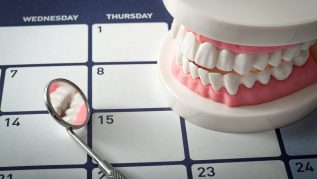
Routine Checkup & Clean
- At Least Every 6 Months
- Checkup, Examination & Cleaning
- Keeps Teeth Healthy

"Popular"
Root Canal
Treatment
- Safe & Effective
- Retain Biting Capabilities
- Preserve Teeth for Many Years

"Popular"
Braces / Orthodontic Treatment
- Certified Invisalign Provider
- Kids Orthodontics
- Adult Orthodontics
Experience the My Gentle Dentist Difference
Expect excellence with quick, gentle and pleasant Dental Experience
All our Dental Treatment options are completely personalised for you. Feel absolutely confident knowing you have chosen the right Dental Practice
- Certified Invisalign Provider
- Convenient Interest Free Payment Plans
- Extended Opening Hours
- Customised Treatment to Your Needs
- 100% Patient Care & Comfort
- Saturday Consultations Available


